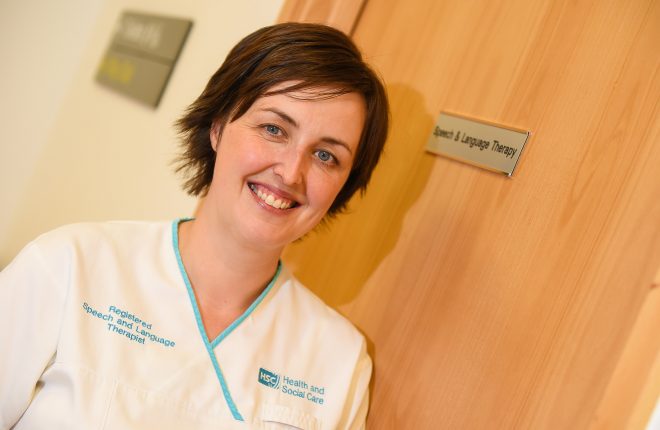
Carolyn McAskie, Speech and Language Therapist at South West Acute Hospital RMG43
Carolyn McAskie qualified as a Speech and Language Therapist in 2001.
After graduating from the University of Ulster at Jordanstown, she worked initially in The Ulster Hospital in Belfast before moving to The Erne Hospital in 2007 and subsequently to the South West Acute Hospital when it opened in 2012 .
Her career path into the profession was prompted when she had a cousin whose first baby girl was born with a severe cleft lip and palate.
“At that stage, I had heard of speech therapists, I knew one worked out of my local health centre with children who had difficulty with their speech sounds. I had no idea what else they did. Through family conversations I learned more about the role the speech therapist played with baby Rachel, initially advising on sucking and feeding, and later on as Rachel got older, working with her on her speech production. I was conscious that this particular health care professional played a vital role, and had a massive impact on this child and her family.”
This experience peaked Carolyn’s interest in the profession, and later, whilst studying for A-Levels when she discovered her subjects fitted the criteria, she signed up for the four year Speech and Language Therapy course.
Carolyn explained that a working day in the life of an adult speech and language therapist can be extremely diverse. She and her colleagues come into contact with clients who have communication or swallowing difficulties as a result of a wide range of medical conditions.
Their caseload can comprise clients who have had cancer, dementia, Parkinson’s Disease, stroke or head injuries. They work with their clients either in the acute hospital as inpatients, or in outpatient clinics. Alternatively, depending on their needs, clients can be seen in the community, in their own homes, nursing or residential care homes, or in day care centres.
The team receive their referrals from hospital specialties such as geriatrics, general medicine, surgery, gastroenterology and ear eose and throat. GPs refer into the service and clients can also self-refer. A specialist branch of the team deal with clients who have a learning disability.
Carolyn’s role involves providing assessment, treatment where appropriate, and strategies or advice to the client and their family on managing their communication or swallowing difficulties moving forward into the future.
“Our intervention is tailored to the specific needs of each individual,” Carolyn says. “We focus on working closely with the client and their carer to firstly identify their goals, then we facilitate the client to meet them. Some clients progress quickly back to their previous level of functioning. However for some, our intervention is geared towards supporting them in adjusting to a new style of communicating, or eating and drinking with dietary modifications.”
It is this variety in the job which Carolyn particularly enjoys: “My working week can vary greatly from one day to the next. On a Monday morning, we might be asked to attend a medical ward to help establish the optimum type of feeding for a client who has an advanced condition and is coming towards the end of their life, with the aim being the person’s pleasure and comfort.
“That afternoon we could be providing training to multidisciplinary colleagues on how best to communicate with someone who is experiencing speech difficulties after a stroke. On Tuesday morning we might be providing specialist vocal exercises to a teacher who has developed hoarseness as a result of the way they are using their voice.
“The same afternoon we could be working in the X-Ray Department alongside our Radiology colleagues, performing a X-Ray of someone’s swallow to determine if they have foods or fluids entering the lungs. Wednesday could comprise of helping establish the use of a high-tech IT-based communication aid with a client who has severely slurred speechas result of Motor Neurone Disease.
“Later that day we might be working with staff in a residential setting to help plan the dining room environment so their clients with learning disability might be facilitated to eat and drink in the safest way possible minimising the risk of choking. No two days are ever the same”.
Carolyn says that working as part of a close team is invaluable and affords the opportunity to share ideas and support one another when facing complex cases.
“I particularly enjoy working closely with my SLT colleagues and those in the wider multidisciplinary team such as physiotherapists, occupational therapists, dieticians, nursing colleagues and consultants to achieve our joint goals for the clients”.
When asked about the pros and cons of a job as a health care professional today, Carolyn explained that it can be a challenge to provide a timely and high quality service to all the clients who get referred, given the current climate in Health Care where resources are at a premium and reducing costs is at the front of everyone’s mind.
“We are continually thinking of how we can do things better and more efficiently,” she said, adding that even in the context of these issues, the role of an Adult Speech and Language Therapist is an extremely rewarding one.
“We all agree it’s lovely to meet clients we have treated in the past, and to see them having a good quality of life with functional communication skills, or being able to eat and drink normally and safely is just great. Knowing we have played some small in that gives us great job satisfaction.”
Posted: 9:35 pm September 25, 2016








